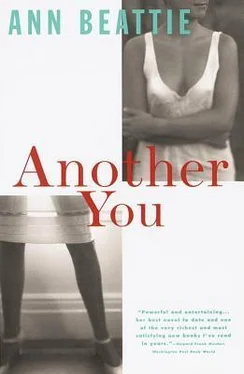Ann Beattie - Another You
Здесь есть возможность читать онлайн «Ann Beattie - Another You» весь текст электронной книги совершенно бесплатно (целиком полную версию без сокращений). В некоторых случаях можно слушать аудио, скачать через торрент в формате fb2 и присутствует краткое содержание. Год выпуска: 2014, Издательство: Vintage Books, Жанр: Современная проза, на английском языке. Описание произведения, (предисловие) а так же отзывы посетителей доступны на портале библиотеки ЛибКат.
- Название:Another You
- Автор:
- Издательство:Vintage Books
- Жанр:
- Год:2014
- ISBN:нет данных
- Рейтинг книги:5 / 5. Голосов: 1
-
Избранное:Добавить в избранное
- Отзывы:
-
Ваша оценка:
- 100
- 1
- 2
- 3
- 4
- 5
Another You: краткое содержание, описание и аннотация
Предлагаем к чтению аннотацию, описание, краткое содержание или предисловие (зависит от того, что написал сам автор книги «Another You»). Если вы не нашли необходимую информацию о книге — напишите в комментариях, мы постараемся отыскать её.
Another You — читать онлайн бесплатно полную книгу (весь текст) целиком
Ниже представлен текст книги, разбитый по страницам. Система сохранения места последней прочитанной страницы, позволяет с удобством читать онлайн бесплатно книгу «Another You», без необходимости каждый раз заново искать на чём Вы остановились. Поставьте закладку, и сможете в любой момент перейти на страницу, на которой закончили чтение.
Интервал:
Закладка:
“So does a little part of you think that people my age invite trouble?” she said.
“I think what happened was horrible, if that’s what you mean.”
“Marshall, you’ve never been anything like a prick with me, and I appreciate it,” she said.
He tried not to reveal his surprise that she had called him Marshall. But why not, for heaven’s sake? He’d been in the restaurant with her for more than an hour, drinking and listening to the troubling story she’d needed to tell. He’d held her hand in the car. Who should he be, if not Marshall?
“Don’t give her Valium if she’s been drinking,” he said. “Promise?”
“Okay,” she said.
“And don’t take it yourself, either.”
“It didn’t do anything,” she said.
“Just don’t do it,” he said.
She nodded.
Myrtis gave them the check, her name and the word “Thanx” written on the back, three horizontal lines under “Thanx.”
“Thanks,” Cheryl said, as he reached for his wallet. “I have five dollars, but I don’t suppose you’d take it.”
He shook his head no.
“I’ll hold your hand when we get to the car,” she said.
He looked at her, embarrassed. He’d hoped what happened before wouldn’t be directly addressed. He’d counted on it. “Ms. Lanier,” he said, speaking quickly to cover his surprise. “Can I truly count on such an exceptional pleasure?”
“But that’s all, Mr. Lockard ,” she said. “First date, and all that.”
He could feel himself blush.
“See what it’s like to be mocked?” she said. “You don’t have to do that so much. Really. I advise you to tone it down.”
She slipped her hand into his as he reached above her one-handed to open the restaurant door. That way, ducking their heads against the wind, they hurried to the car in the lightly falling snow.
Dearest Martine:
It seems we are always days and weeks away from seeing you. Every time I count the days, Alice reminds me that what I am really counting is weeks: 16 days should not be considered days, but more than two weeks, properly speaking, and then I realize I must write .
The trip to New York has been quite wonderful, and of course we have eaten wonderfully well. We thought of you when we had chicken stuffed with roasted peppers and porcini. Have two creative chefs coincidentally invented that, or did you sneak a look at a cookbook?
There is a slight chance Ethan Bedell will stop by quite soon after our arrival. If he should call before we arrive, please try to put him off as I’ll need time to lay in the port he always expects (and appreciates, dear soul!), and to try to encourage sympathy toward him from Alice. We must all three join hands and recite together that we will not be drawn into his unhappiness when he arrives. When people are united in their intolerance of his gloominess, he quickly snaps to and becomes a much happier fellow .
Martine. We speak of you so many times a day. Alice said last night she hoped you were planting carrots so the rabbits would be attracted to the garden. What a feeling: to so love seeing them, yet they devour the garden greens as if our hand-clapping was only musical accompaniment to their munching .
Please plant lemon verbena .
Don’t work too hard. We both mean this. Alice looks over my shoulder. She says to tell you she is living vicariously, through you, enjoying the beautiful spring .
With affection ,
M .
2
SONJA AWAKENED EARLY to see Marshall, wrapped in a bathrobe, an afghan draped over his shoulders, his sleep-crushed hair sticking up in an Ed Grimley, sitting on a chair he’d pulled close to the window, hands on his knees in the gesture of a small boy being told a story. What story might Marshall be imagining? The familiar story of Old Mister Whiteflakes taunting everyone because he could snow all winter, whenever he wanted, however much he liked? Or perhaps he was hearing more personal stories. Internal stories. A moment in his mother’s life, as previously recounted by his father. Something about her knitting, constantly knitting, as if she could make ordinary things, such as scarves and mittens, become magical because, unlike life, they would not unravel. Who had she been, really, that woman dead so many years, whom Evie, her successor, still talked about so adoringly, that young woman kissing her children’s gloves with her lipsticked blessing and embroidering the wristbands with forget-me-nots?
Marshall’s head was tilted back enough so that his eyes could connect with the moon, yet from across the room, from the bed, from which she could see only the tipped-back crown of his head, she felt sure his eyes were closed, that he had brought his chair close to the window not to look at the sky but to bask in the presence of darkness, the glimmer of starlight, the opacity of the moon. And then, in her sleepy reverie, she contradicted her thinking: one could describe, to a blind man, what the starbursts and showers of light were like. Oh really? How could one do that? With an illuminating analogy? Through the charm of synesthesia? She had been watching her husband, thinking, Thank God he’s not blind , certain that she would be a terrible guide for anyone who could not see exactly what she saw. Yet what foolishness that was: objectivity. Even little children knew that a thrice-whispered word metamorphosed to another, that no tadpole restrained itself from transformation to a frog, to say nothing of individual perceptions, which made a puddle a pond and a lake an ocean.
Marshall shifted in the chair, the afghan slid to the floor, she put her fingers to her lips as if she feared something. Then, in startled confusion, he rose from the chair, disoriented — there: she knew he had been asleep — and, in a kind of sleepwalk, started toward the bed.
Marshall curled on his side, on top of the covers, his face window-pane cold. She tried to tug the sheet and blanket from underneath to cover him, but it was no use. He stayed the way he had first fallen on the bed, the twist of afghan a half chrysalis binding his torso, his lips open, robe bunched around his chest. She touched his shoulder. If there had not been enough light in the room for her to see that this provoked a frown, even in sleep, she would have persisted, but it was too cruel — and where, exactly, would she begin explaining to him her irrational thoughts? Oh, darling, wake up: I’ve been thinking about tadpoles and puddles and lakes, and I’m very happy you aren’t blind . They were so bizarre that she tried to forget them herself, nestling against him, pulling covers up from behind to warm her back, then trying to catch the rhythm of his suddenly quieter breathing, as if, even in sleep, he had made a bargain with her: If I don’t have to listen to you, you don’t have to listen to me .
She was not going to get back to sleep, so she went downstairs and looked for something to do. Actually, it came as a relief that Marshall had so captivated her attention — that she had seen him as vulnerable, that she had felt close to him as he struggled through the night. Because she had been struggling through quite a few difficult nights herself lately, stung by guilt over the affair she was having with her boss, Tony Hembley, trying to deny the fact that in such situations, now that the ’60s were long gone, eventually she would have to decide.
Beside the stairs was a basket of things that needed to be ironed, including her favorite pillow shams that wrinkled like crepe paper but could be quickly steamed into satiny softness. But she was too sleepy to iron. Instead, she went into the living room and curled up, pulling an afghan Evie had knitted for her over her lap, turning on the reading light, and scanning Sunday’s still-unfinished crossword puzzle. She saw that Marshall had written in a couple of words she’d missed in pencil, and also that he’d doodled as he thought about the answers, drawing circles that became ovals, then what looked like a fried egg, its albumen spreading out lacily from the yolk. Or maybe it was no such thing; maybe she was just hungry. For another few minutes she gave thought to “Poet translated by FitzGerald”—wouldn’t Marshall have known that? — yet Marshall was always preoccupied, so possibly he had not even glanced at that part of the puzzle. Even when he was supposed to be asleep, he often moved around the room, sleepwalking or just plain drifting, quietly walking part of the night away. It was to her advantage that he was so often in a world of his own, or distracted, she thought, and then, instantly, felt ashamed of her thoughts. Gordon, Marshall’s brother, was apparently a restless sleeper too; at least, his new wife — the only one of his wives she had ever had a real correspondence with — often remarked on Gordon’s insomnia, or his troubled sleep. The brothers were at once physically similar and also dissimilar: both had unusually colored green eyes, deeply hooded; both had large feet and hands, though only Marshall’s had a sculptural delicacy. Of course, working with his hands had toughened and abraded Gordon’s hands in a way Marshall’s behind-the-lectern gestures had not. Also, the difference in age between them, which was not great, would not explain Marshall’s almost unlined skin, the tiny crow’s-feet at his eyes drawing attention to one of his best features. Marshall was six feet tall, though he slumped so much he didn’t appear particularly tall. Gordon was shorter by several inches, though he held himself ramrod straight, shoulders squared — perhaps the carriage he’d learned in the army, while Marshall was pursuing his Ph.D. She lifted the photograph of herself and Marshall off the side table and rubbed the dusty frame. It had been taken in Boston many years ago by the teenage son of a woman she’d worked with. What had happened to the woman and her talented son, who had been so passionate about his photography courses? She’d lost track of so many people, and so had Marshall — though he’d never had as many friends and acquaintances as she. He maintained that men didn’t socialize the way women did, but lately he didn’t socialize at all, and she hardly did, herself: just the book discussion group, or an odd evening out when Marshall taught his night class. In the photograph, Marshall’s hand clasped her shoulder, and he nuzzled her hair, which was much longer, falling below her shoulders. His eyes were half-closed, his thoughts turned inward, but she hadn’t been relaxed at all: her eyes a bit too wide, her smile slightly artificial. Still, the tenderness between them showed. Then and now, when he wasn’t thinking about three things at once, going in one direction looking for his briefcase and another to find the pile of papers he’d just graded, meanwhile forgetting his watch on the dresser and leaving the lunch bag on the kitchen counter, he would look at her appreciatively and his gaze would calm her. She knew he loved her, but she was often surprised to see that he was looking quietly at her simply because he liked her. She didn’t mind at all that it was the same way he would look at the covers of certain books, or the way he’d look out the window and appreciate, for a brief second, the sight of branches blowing in the wind, or be amused by squirrels cavorting on the telephone wires.
Читать дальшеИнтервал:
Закладка:
Похожие книги на «Another You»
Представляем Вашему вниманию похожие книги на «Another You» списком для выбора. Мы отобрали схожую по названию и смыслу литературу в надежде предоставить читателям больше вариантов отыскать новые, интересные, ещё непрочитанные произведения.
Обсуждение, отзывы о книге «Another You» и просто собственные мнения читателей. Оставьте ваши комментарии, напишите, что Вы думаете о произведении, его смысле или главных героях. Укажите что конкретно понравилось, а что нет, и почему Вы так считаете.












